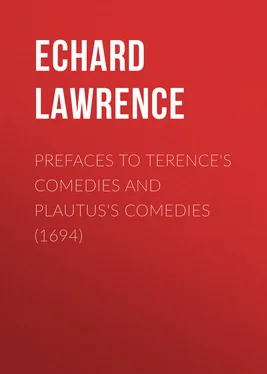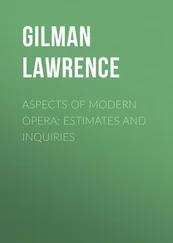Lawrence Echard - Prefaces to Terence's Comedies and Plautus's Comedies (1694)
Здесь есть возможность читать онлайн «Lawrence Echard - Prefaces to Terence's Comedies and Plautus's Comedies (1694)» — ознакомительный отрывок электронной книги совершенно бесплатно, а после прочтения отрывка купить полную версию. В некоторых случаях можно слушать аудио, скачать через торрент в формате fb2 и присутствует краткое содержание. Издательство: Иностранный паблик, Жанр: Критика, foreign_antique, foreign_prose, на английском языке. Описание произведения, (предисловие) а так же отзывы посетителей доступны на портале библиотеки ЛибКат.
- Название:Prefaces to Terence's Comedies and Plautus's Comedies (1694)
- Автор:
- Издательство:Иностранный паблик
- Жанр:
- Год:неизвестен
- ISBN:нет данных
- Рейтинг книги:4 / 5. Голосов: 1
-
Избранное:Добавить в избранное
- Отзывы:
-
Ваша оценка:
- 80
- 1
- 2
- 3
- 4
- 5
Prefaces to Terence's Comedies and Plautus's Comedies (1694): краткое содержание, описание и аннотация
Предлагаем к чтению аннотацию, описание, краткое содержание или предисловие (зависит от того, что написал сам автор книги «Prefaces to Terence's Comedies and Plautus's Comedies (1694)»). Если вы не нашли необходимую информацию о книге — напишите в комментариях, мы постараемся отыскать её.
Prefaces to Terence's Comedies and Plautus's Comedies (1694) — читать онлайн ознакомительный отрывок
Ниже представлен текст книги, разбитый по страницам. Система сохранения места последней прочитанной страницы, позволяет с удобством читать онлайн бесплатно книгу «Prefaces to Terence's Comedies and Plautus's Comedies (1694)», без необходимости каждый раз заново искать на чём Вы остановились. Поставьте закладку, и сможете в любой момент перейти на страницу, на которой закончили чтение.
Интервал:
Закладка:
The praise of Dryden is to some extent double-edged since it is an implicit assertion of the point made in both Prefaces, that English writers had much to learn from the Roman dramatists. Echard uses the Prefaces to assess and compare Plautus and Terence, but he also uses them as a springboard for a critique of the state of English comedy. Like much neoclassical criticism it is, of course, derivative. The stock comparison of Plautus and Terence comes from Anne Dacier, 8 8 Les comédies de Plaute , ed. and trans. Anne Dacier (Paris, 1683). For a further statement of her views, see Les comédies de Térence (Paris, 1688).
and Echard’s footprints can be tracked in the snows of Cicero, Scaliger, Rapin, André Dacier, the Abbé D’Aubignac, and Dryden. Having set the Ancients against the Moderns, Echard is able to attack the looseness of English double plots by pointing to Terence’s success within a similar structure. He is also able to praise Terence’s genteel style. Against this, Echard admits, along with his precursors, Plautus’ superiority in point of vis comica , which he defines, interestingly, as “ Liveliness of Intreague ” (sig. a8). Echard is thus able to claim, with considerable conviction, the superiority of English comedy in several areas, especially in its variety, its humour, “in some Delicacies of Conversation ,” and “above all in Repartée ” ( Terence’s Comedies , p. xi).
What the English had to learn, in Echard’s view, was “regularity,” that is, the discipline imposed upon a dramatist by observing the Unities, and obeying the other “rules of the drama” (such as the liaisons ), in pursuit of verisimilitude and tautness of structure. Echard’s main hope was that his translation and notes would correct his contemporaries’ habit of ignoring the Roman dramatists’ “ essential Beauties,” and “contenting themselves with considering the superficial ones, such as the Stile , Language , Expression , and the like, without taking much notice of the Contrivance and Management, of the Plots, Characters, etc. ” ( Plautus , sig. a1). The remarkable fact about Echard’s discussion of these matters, despite his dependence at times upon that arch-pedant, the Abbé D’Aubignac, 9 9 In particular, see his discussion of the liaisons which is derived from François Hédelin, Abbé D’Aubignac, La practique du théâtre .. (Paris, 1669), pp. 117-19, 315-20. D’Aubignac’s work was translated into English as The Whole Art of the Stage .. (1684).
is the critical intelligence with which he puts forward his argument. Unlike many neoclassical critics, Echard keeps his eyes fixed firmly on the strengths and weaknesses of Restoration comedy within the context of previous English comedy and the Restoration stage itself. A sign of this is his attention to practical details, which take the form of one or two valuable notes on the theatre of his day. We learn, for instance, that actors were in the “custom of looking.. full upon the Spectators,” and that some members of the Restoration audience took printed copies into the playhouse in order to be able to follow the play on the stage. 10 10 Plautus’s Comedies , sig. a8v; Terence’s Comedies , p. xiii.
It is a real loss to the historian of drama and to the critic that these two volumes were Laurence Echard’s solitary adventure into the criticism and translation of drama.
PREFACE
SInce long Prefaces are lately much in Fashion upon this and the like Occasions, why may not we be allow’d some tolerable Liberty in this kind; provided we keep close to our Author, and our own Translation of him. As for our Author, wherever Learning, Wit or Judgment have flourish’d, this Poet has always had an extraordinary Reputation. To mention all his Excellencies and Perfections were a Task too difficult for us, and perhaps for the greatest Criticks alive; so very few there are that perfectly understand all of ’em; yet we shall venture at some of the most Remarkable.
To begin with him in general. He was certainly the most Exact, the most Elaborate, and withal the most Natural of all Dramatick Poets; His Stile so neat and pure, his Characters so true and perfect, his Plots so regular and probable, and almost every thing so absolutely just and agreeable, that he may well seem to merit that Praise which several have given him, That he was the most correct Author in the World. To compare him with Plautus, the other great Latin Comedian, we may observe that Plautus had more Wit and Spirit, but Terence more Sense and Judgment; the former’s Stile was rich and glaring, the latter’s more close and even: Plautus had the most dazelling out-side, and the most lively Colours, but Terence drew the finest Figures and Postures, and had the best Design; the one pleas’d the Vulgar, but our Author the Better sort of people; the former wou’d usually set his Spectators into a loud Laughter, but the latter steal ’em into a sweet Smile that shou’d continue from the beginning to the end of the Representation: in short, Plautus was more lively and vigorous, and so fitter for Action; and Terence more grave and serious, and so fitter for Reading. Tho’ Plautus’s Beauties were very extraordinary, yet he had his Faults and Indecorums very frequent; but Terence’s Excellencies (tho’ possibly inferior to some of the others) were more general, better dispers’d, and closer continu’d; and his Faults so inconsiderable, and so very few, that Scaliger said, There were not three to be found throughout the Six Plays. So that our Author seems to want nothing to make him absolutely compleat, but only that same Vis Comica that Cæsar wishes he had, and which Plautus was Master of in such a high degree. We shall determine nothing between ’em, but leave ’em good Friends as we found ’em.
This may be sufficient for our Author’s Excellencies in general; for his particular ones, we shall begin with his Stile, a thing he has been admir’d for in all Ages, and truly he deserves it; for certainly no one was ever more accurate, natural, and clear in his Expressions than he. But to be a little more particular in this Matter, we shall give you some few of our Author’s Excellencies in this kind under three or four different Heads.
And first, We may observe of his Words, that they are generally nicely chosen, extreamly proper and significant; and many of ’em carry so much Life and Force in ’em, that they can hardly be express’d in any other Language without great disadvantage to the Original. To instance in these following. Qui cum ingeniis conflictatur ejusmodi. Ut animus in spe atque in timore usque ante hac attentus fuit. Nisi me lactasses amantem, & falsa spe produceres. Pam. Mi Pater. Si. Quid mi Pater? Quasi tu hujus indigeas Patris. Tandem ego non illâ caream, si sit opus, vel totum triduum. Par. Hui? Universum triduum. Quam elegans formarum spectator siem. Hunc comedendum & deridendum vobis propino.
We shall next take notice of one or two Instances of the Shortness and Clearness of his Narrations; as that which Tully mentions. Funus interim procedit sequimur, ad Sepulchrum venimus, in ignem posita est, Fletur. Another may be that in Phormio. Persuasum est homini, factum est, ventum est, vincimur, duxit.
Another remarkable Beauty of his Stile appears in his Climaxes; where every Word is Emphatical, heightens the Sense, and adds considerably to what went before. As, Hæc verba Mehercule una falsa Lachrymula, quam oculos terendo miserè vix vi expresserit, restinguet. Quod ille unciatim vix de demenso suo, suum defraudans genium, comparsit miser.
The last thing we shall give any instance of, is the Softness and Delicacy of his Turns; of which many might be produced; but we think these few may be sufficient for our purpose. Eheu me miseram! Cur non aut isthæc mihi ætas & forma est, aut tibi hæc sententia. Nam si ego digna hac contumelia sum maxime, at tu indignus qui faceres tamen. Nam dum abs te absum, omnes mihi labores fuere, quos cepi, leves, præterquam tui carendum quod erat. Palam beatus, ni unum desit, animus qui modeste isthæc ferat. Aliis, quia defit quod amant, ægre est, tibi, quod super est, dolet. And as for the Purity of his Language in general; we find it very much commended even by Tully himself. And One of the Moderns is not at all out of the way when he tells us: That the Latin Tongue will never be lost, as long as Terence may be had.
Читать дальшеИнтервал:
Закладка:
Похожие книги на «Prefaces to Terence's Comedies and Plautus's Comedies (1694)»
Представляем Вашему вниманию похожие книги на «Prefaces to Terence's Comedies and Plautus's Comedies (1694)» списком для выбора. Мы отобрали схожую по названию и смыслу литературу в надежде предоставить читателям больше вариантов отыскать новые, интересные, ещё непрочитанные произведения.
Обсуждение, отзывы о книге «Prefaces to Terence's Comedies and Plautus's Comedies (1694)» и просто собственные мнения читателей. Оставьте ваши комментарии, напишите, что Вы думаете о произведении, его смысле или главных героях. Укажите что конкретно понравилось, а что нет, и почему Вы так считаете.












